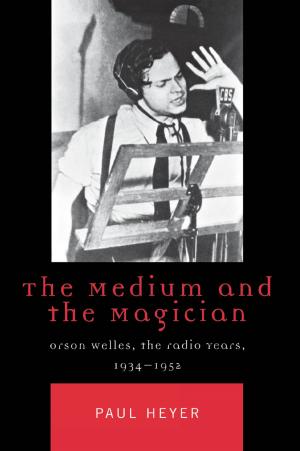Gene Roddenberry's Star Trek
The Original Cast Adventures
Nonfiction, Entertainment, Performing Arts, Television, History & Criticism| Author: | ISBN: | 9781442249882 | |
| Publisher: | Rowman & Littlefield Publishers | Publication: | May 14, 2015 |
| Imprint: | Rowman & Littlefield Publishers | Language: | English |
| Author: | |
| ISBN: | 9781442249882 |
| Publisher: | Rowman & Littlefield Publishers |
| Publication: | May 14, 2015 |
| Imprint: | Rowman & Littlefield Publishers |
| Language: | English |
When it premiered on NBC in September 1966, Star Trek was described by its creator, Gene Roddenberry, as “Wagon Train to the stars.” Featuring a racially diverse cast, trips to exotic planets, and encounters with an array of alien beings who could be either friendly or hostile, the program opened up new vistas for television. Along with The Twilight Zone and The Outer Limits, Star Trek represented one of the small screen’s rare ventures into science fiction during the 1960s. Although the original series was a modest success during its three-year run, its afterlife has been nothing less than a cultural phenomenon. To celebrate the show’s debut fifty years later, it’s time to reexamine one of the most influential programs in history.
In Gene Roddenberry’s Star Trek: The Original Cast Adventures, Douglas and Shea T. Brode present a collection of essays about the series and its various incarnations over the years. Contributors discuss not only the 1960s show but also its off-shoots, ranging from novels and graphic novels to toys and video games, as well as the films featuring Captain Kirk, Mr. Spock, and the rest of the Enterprise crew. Essays address the show’s religious implications, romantic elements, and its role in the globalization of American culture. Other essays draw parallels between the series and the Vietnam War, compare Star Trek II to Milton’s Paradise Lost, posit Roddenberry as an auteur, and consider William Shatner as a romantic object.
With its far-reaching and provocative essays, this collection offers new insights into one of the most significant shows ever produced. Besides television and film studies, Gene Roddenberry’s Star Trek—a companion volume to The Star Trek Universe—will be of interest to scholars of religion, history, gender studies, queer studies, and popular culture, not to mention the show’s legions of fans.
When it premiered on NBC in September 1966, Star Trek was described by its creator, Gene Roddenberry, as “Wagon Train to the stars.” Featuring a racially diverse cast, trips to exotic planets, and encounters with an array of alien beings who could be either friendly or hostile, the program opened up new vistas for television. Along with The Twilight Zone and The Outer Limits, Star Trek represented one of the small screen’s rare ventures into science fiction during the 1960s. Although the original series was a modest success during its three-year run, its afterlife has been nothing less than a cultural phenomenon. To celebrate the show’s debut fifty years later, it’s time to reexamine one of the most influential programs in history.
In Gene Roddenberry’s Star Trek: The Original Cast Adventures, Douglas and Shea T. Brode present a collection of essays about the series and its various incarnations over the years. Contributors discuss not only the 1960s show but also its off-shoots, ranging from novels and graphic novels to toys and video games, as well as the films featuring Captain Kirk, Mr. Spock, and the rest of the Enterprise crew. Essays address the show’s religious implications, romantic elements, and its role in the globalization of American culture. Other essays draw parallels between the series and the Vietnam War, compare Star Trek II to Milton’s Paradise Lost, posit Roddenberry as an auteur, and consider William Shatner as a romantic object.
With its far-reaching and provocative essays, this collection offers new insights into one of the most significant shows ever produced. Besides television and film studies, Gene Roddenberry’s Star Trek—a companion volume to The Star Trek Universe—will be of interest to scholars of religion, history, gender studies, queer studies, and popular culture, not to mention the show’s legions of fans.















